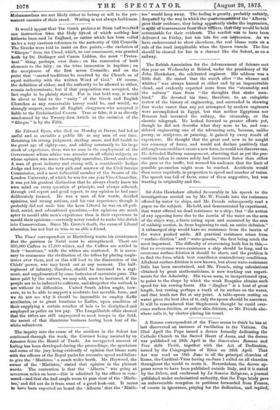Sir John Hawkshaw alluded favourably in his speech to the
investigations carried on by Mr. W. Froude into the resistance offered by water to ships, and Mr. Froude subsequently read a paper on the subject. He held, and demonstrated by experiment, that water offered no dead resistance to a ship ; that "the notion of any opposing force due to the inertia of the water on the area of the ship's way, a force acting upon and measured by the area of midship section, is, from beginning to end, an entire delusion." A submerged ship would have no resistance from the inertia of the water pushed aside. All practical resistance arises from " surface-friction" and " wave-genesis," the first being much the most important. The difficulty of overcoming both lies in this,— that to overcome wave-resistance a ship should be long, and to overcome surface-friction it should be short, and the problem is to find the form which best conciliates contradictory conditions. All about surface-friction is now known, but about wave-resistance little has been ascertained, and Mr. Froude, using calculations obtained by great mathematicians, is now working out experi- ments for the Admiralty. His views seem, to inexperienced eyes, to point to the shape by which the weak Bengalee obtains such speed for his rowing-boats. His " dinghee " is a boat of great length, but resting perhaps a tenth of its surface on the water, and that tenth not flat at any point. A table-spoon resting on water gives the best idea of it, only the spoon should be narrower. It will be remembered that Stephenson thought he could over- come surface-friction, or rather skin-friction, as Mr. Froude else- where calls it, by electro-plating his vessel.






























 Previous page
Previous page